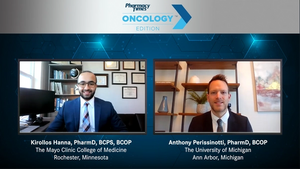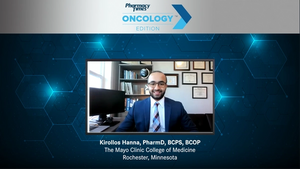Kirollos S. Hanna, PharmD, BCPS, BCOP, FACCC, FAPO
Articles by Kirollos S. Hanna, PharmD, BCPS, BCOP, FACCC, FAPO

Kirollos S. Hanna, PharmD, BCPS, BCOP, FACCC, FAPO, discusses how oncology pharmacists can lead value-based care efforts under the Enhanced Oncology Model (EOM) by improving care coordination, managing costs, aligning with performance metrics, and leveraging clinical data systems to enhance patient outcomes.

Kirollos S. Hanna, PharmD, BCPS, BCOP, FACCC, FAPO, discusses the value of the 2025 ATOPP Summit in advancing oncology pharmacy through collaboration, innovation, and actionable strategies aligned with evolving value-based care models.

Improving Transitions of Care for Patients Receiving Bispecific Therapies and Final Recommendations
ByRyan Haumschild, PharmD, MS, MBA,Issam S. Hamadeh, PharmD, BCPS, BCOP,Kirollos S. Hanna, PharmD, BCPS, BCOP, FACCC, FAPO,Brooke Peters, PharmD, BCOP,Gabe Hinojosa, PharmD, BCOP Panelists discuss how key recommendations for optimizing bispecific therapy care focus on establishing robust communication protocols between academic and community centers while ensuring community centers develop comprehensive infrastructure including staff training, emergency protocols, and care coordination pathways.

Administering Bispecifics in the Community vs Academic Centers
ByRyan Haumschild, PharmD, MS, MBA,Issam S. Hamadeh, PharmD, BCPS, BCOP,Kirollos S. Hanna, PharmD, BCPS, BCOP, FACCC, FAPO,Brooke Peters, PharmD, BCOP,Gabe Hinojosa, PharmD, BCOP Panelists discuss understanding the comparative advantages, decision-making factors, infrastructure requirements, and partnership models for administering bispecific antibodies in community vs academic settings, with particular focus on patient care logistics and referral pathways.

Navigating REMS Requirements and Educating Other Stakeholders on Bispecific Therapies
ByRyan Haumschild, PharmD, MS, MBA,Issam S. Hamadeh, PharmD, BCPS, BCOP,Kirollos S. Hanna, PharmD, BCPS, BCOP, FACCC, FAPO,Brooke Peters, PharmD, BCOP,Gabe Hinojosa, PharmD, BCOP Panelists discuss the guidance on managing REMS program compliance for bispecific therapies and strategies for educating non-oncology health care providers about cytokine release syndrome (CRS) and immune effector cell–associated neurotoxicity syndrome (ICANS) toxicities.

Infection Prevention and Leveraging EHR for Bispecific Therapy Management
ByRyan Haumschild, PharmD, MS, MBA,Issam S. Hamadeh, PharmD, BCPS, BCOP,Kirollos S. Hanna, PharmD, BCPS, BCOP, FACCC, FAPO,Brooke Peters, PharmD, BCOP,Gabe Hinojosa, PharmD, BCOP Panelists discuss insights on infection prevention protocols and electronic health record (EHR)–based toxicity management strategies for patients receiving bispecific antibody therapies in relapsed/refractory multiple myeloma (RRMM).

Managing CRS and ICANS: Approaches and Protocols
ByRyan Haumschild, PharmD, MS, MBA,Issam S. Hamadeh, PharmD, BCPS, BCOP,Kirollos S. Hanna, PharmD, BCPS, BCOP, FACCC, FAPO,Brooke Peters, PharmD, BCOP,Gabe Hinojosa, PharmD, BCOP Panelists discuss how clinical management of CAR T-cell therapy–associated toxicities focuses primarily on early recognition and prompt intervention with tocilizumab and/or corticosteroids for cytokine release syndrome (CRS) and immune effector cell–associated neurotoxicity syndrome (ICANS), following established grading systems and treatment algorithms.

Preventing CRS and ICANS Across Sites of Care
ByRyan Haumschild, PharmD, MS, MBA,Issam S. Hamadeh, PharmD, BCPS, BCOP,Kirollos S. Hanna, PharmD, BCPS, BCOP, FACCC, FAPO,Brooke Peters, PharmD, BCOP,Gabe Hinojosa, PharmD, BCOP Panelists discuss understanding institutional protocols for managing cytokine release syndrome (CRS) and immune effector cell–associated neurotoxicity syndrome (ICANS) prophylaxis in bispecific antibody therapy, along with criteria for safely selecting patients for outpatient step-up dosing.

Safety Profiles of Bispecific Antibodies for RRMM
ByRyan Haumschild, PharmD, MS, MBA,Issam S. Hamadeh, PharmD, BCPS, BCOP,Kirollos S. Hanna, PharmD, BCPS, BCOP, FACCC, FAPO,Brooke Peters, PharmD, BCOP,Gabe Hinojosa, PharmD, BCOP Panelists discuss how bispecific antibody therapies in relapsed/refractory multiple myeloma commonly present with cytokine release syndrome (CRS), immune effector cell–associated neurotoxicity syndrome (ICANS), and increased infection risks, while talquetamab specifically exhibits distinctive adverse events including nail changes, skin reactions, and oral toxicities.

Resources and Education for Operationalizing Bispecifics
ByRyan Haumschild, PharmD, MS, MBA,Issam S. Hamadeh, PharmD, BCPS, BCOP,Kirollos S. Hanna, PharmD, BCPS, BCOP, FACCC, FAPO,Brooke Peters, PharmD, BCOP,Gabe Hinojosa, PharmD, BCOP Panelists discuss how infrastructure including specialized staff training, updated protocols, enhanced monitoring systems, and comprehensive educational resources for health care providers is essential for institutions to successfully implement and optimize bispecific antibody therapies while ensuring patient safety and treatment efficacy.

Dosing Frequency and Formulary Decisions for Bispecific Antibodies
ByRyan Haumschild, PharmD, MS, MBA,Issam S. Hamadeh, PharmD, BCPS, BCOP,Kirollos S. Hanna, PharmD, BCPS, BCOP, FACCC, FAPO,Brooke Peters, PharmD, BCOP,Gabe Hinojosa, PharmD, BCOP Panelists discuss how when selecting between weekly and biweekly dosing schedules for talquetamab and teclistamab in multiple myeloma treatment, health care institutions must carefully weigh factors like patient convenience, monitoring requirements, resource utilization, and total cost of care alongside clinical outcomes to determine optimal treatment pathways for both patient and health system benefits.

Best Practices for Standardizing Step-Up Dosing
ByRyan Haumschild, PharmD, MS, MBA,Issam S. Hamadeh, PharmD, BCPS, BCOP,Kirollos S. Hanna, PharmD, BCPS, BCOP, FACCC, FAPO,Brooke Peters, PharmD, BCOP,Gabe Hinojosa, PharmD, BCOP Panelists discuss how specific recommended dosing schedules exist for step-up medication administration, and protocols should incorporate flexibility for individualized dose adjustments based on patient response, tolerability, and clinical factors while maintaining systematic documentation of any deviations from standard escalation timelines.

Operationalizing Bispecific Therapy and the Impact of CAR T Advancements on Sequencing
ByRyan Haumschild, PharmD, MS, MBA,Issam S. Hamadeh, PharmD, BCPS, BCOP,Kirollos S. Hanna, PharmD, BCPS, BCOP, FACCC, FAPO,Brooke Peters, PharmD, BCOP,Gabe Hinojosa, PharmD, BCOP Panelists discuss how advances in bispecific antibodies and CAR T-cell therapies are transforming treatment approaches for relapsed/refractory multiple myeloma, while presenting complex operational challenges that require innovative institutional strategies.

Current Landscape of Bispecific Therapies for RRMM
ByRyan Haumschild, PharmD, MS, MBA,Issam S. Hamadeh, PharmD, BCPS, BCOP,Kirollos S. Hanna, PharmD, BCPS, BCOP, FACCC, FAPO,Brooke Peters, PharmD, BCOP,Gabe Hinojosa, PharmD, BCOP Panelists discuss how bispecific T-cell–engaging therapies targeting BCMA, GPRC5D, and FcRH5 have emerged as novel immunotherapeutic approaches showing meaningful clinical activity for patients with heavily pretreated relapsed/refractory multiple
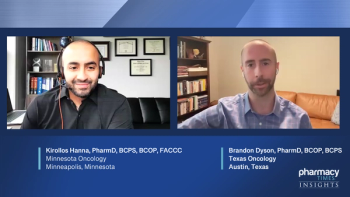
The discussion explores how Medicare's Part D smoothing program in 2025 might impact chronic lymphocytic leukemia patients’ access to and adherence to Bruton tyrosine kinase inhibitor therapies and how pharmacists can help navigate this new program. The session concludes with closing remarks.

The discussion addresses the economic impact of appropriate dose modifications on chronic lymphocytic leukemia management.

The discussion covers when to consider transitioning to a new therapeutic option in CLL and the factors that influence the decision between dose modification and switching therapies.

The discussion explores the frequency and impact of dose modifications due to adverse events, strategies for maintaining outcomes, monitoring protocols, and how these modifications affect long-term CLL therapy effectiveness and treatment decisions.

The discussion addresses when dose modifications are typically required in chronic lymphocytic leukemia treatment and identifies the most common reasons for these modifications.

The discussion covers proactive strategies and interventions for managing adverse events before dose modification and explores supportive care measures for chronic lymphocytic leukemia treatments, including variations based on specific Bruton tyrosine kinase inhibitors.

The discussion explores the evolution of understanding adverse events (AEs) related to Bruton tyrosine kinase inhibitors in chronic lymphocytic leukemia treatment and identifies the primary classwide AEs associated with these therapies.
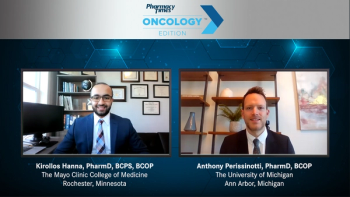
Drs Anthony Perissinotti and Kirollos Hanna provide some important considerations for pharmacists in treating chronic lymphocytic leukemia.

Experts discuss the potential future use of CAR T-cell therapy and bispecific therapeutics for chronic lymphocytic leukemia based on data presented at ASH 2021.
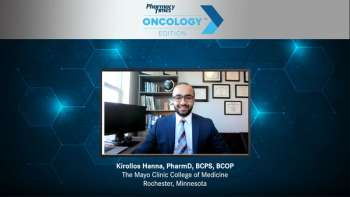
Dr Anthony Perissinotti details an effective new therapy on the horizon in chronic lymphocytic leukemia.

Anthony Perissinotti and Kirollos Hanna discuss considerations for selecting treatment regimens in chronic lymphocytic leukemia.

Chronic lymphocytic leukemia experts debate how to prevent or reduce the risk of tumor lysis in patients.

Anthony Perissinotti, PharmD, BCOP, explains potential scenarios requiring anti-CD20 monoclonal antibodies as a therapy for chronic lymphocytic leukemia.

Kirollos Hanna, PharmD, BCPS, BCOP, reviews the use of anti-CD20 monoclonal antibodies for treating chronic lymphocytic leukemia.

Key opinion leaders discuss data from the MURANO trial on a fixed-duration therapy for relapsed/refractory chronic lymphocytic leukemia.

Dr Anthony Perissinotti explains the new formulation of acalabrutinib for chronic lymphocytic leukemia presented at ASH 2021.








